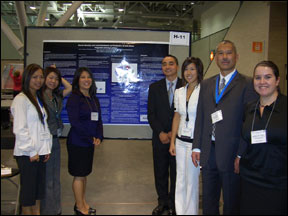About Us...
Established in the Winter of 1994 by Dr. Eric Kohatsu, the Center for Cross-cultural Research focuses broadly on racial identity, racism, prejudice and stereotyping, minority mental health, and Asian American and Latino psychological issues. Dr. Kohatsu has consistently conducted research on racial identity issues, racial prejudice and stereotyping, and the psychological impact of racism. Both quantitative and qualitative methods have been employed in the research conducted at the Center. The second major objective for the Center for Cross-cultural Research is to provide opportunities for minority students to receive the necessary mentoring and support to maximize their potentials as future professional psychologists and as individuals committed to social change/social justice issues.
Pictured above, second from right, is Dr. Kohatsu with several of his lab students at APA's 2009 Convention.
Research Projects
Recent projects include examining anti-Asian prejudice and negative personal experiences with Asians among People of Color using racial identity and color-blindness models as the overarching framework. Two different models of anti-Asian prejudice have been used in these recent series of empirical studies. Other projects have involved examining how racial identity relates to color-blind racial attitudes across racial groups, such as Latinos, Asians, and Blacks, and utilizing racial identity to account for behavioral, attitudinal, and affective components of interracial contact with Asians among different socioracial groups.
Summary and Future Directions
In light of the consistently high standards upheld in training students and in the active research program established, it is anticipated that the Center for Cross-cultural research will continue to flourish. There is no other programmatic research on the west coast dedicated to the examination of racial identity and its counseling applications with the goal of helping professionals better understand the psychosocial functioning of, for example, Asians and Latinos, in different socicultural contexts. Similarly, the Center for Cross-cultural research will also continue to serve a unique function by conducting outreach to the surrounding communities.
Students interested in obtaining invaluable experience in preparation for doctoral studies and a career in psychology should contact Dr. Kohatsu at [email protected] or [email protected].
Additional Sections
